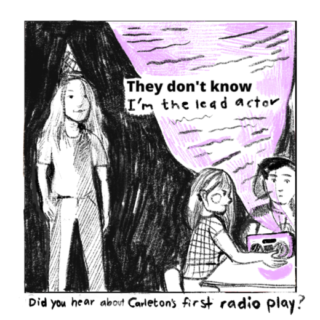Three master’s students from Carleton presented their research on Canadian Blood Services’ donation deferral policies during a virtual Science Café as part of a series hosted by the Faculty of Science.
Katie Baker, Jaya Rastogi and Sebastian Steven led the talk on Nov. 17, which included a 20-minute presentation and 40-minute open discussion. The discussion focused on gay, bisexual and other men who have sex with men (gbMSM), as well as transgender and non-binary individuals.
The online café, which was open to Carleton students and faculty and community members, focused on a survey conducted by the research team earlier this year. The team asked young adults if Canadian Blood Services’ current screening questionnaire for gbMSM could be improved.
During the presentation, the research team said Canadian Blood Services has had a three-month celibacy requirement for gbMSM since 1977. According to its website, thousands of hepatitis C infections were investigated during a 1998 public inquiry into a contaminated blood crisis. The policy continues despite the subsiding of the crisis, but Canadian Blood Services says it will send a proposal to Health Canada by the end of 2021 to remove the waiting period.
“Hopefully we raised a little awareness through our interviews [with survey participants] and hopefully we can continue to do that through into the future,” Rastogi said.
In their presentation, the team showed that adults between the ages of 18–24 were supportive of expanding eligibility for gbMSM to donate blood.
When shown the current screening questions, some survey participants said they wanted more context while answering the questions. Others said the questions made them uncomfortable, citing that the motive behind the questions seemed discriminatory.
Th research team said a common theme in the survey results was that many participants thought there was a lack of understanding about the screening questions’ relevance, general discomfort when answering the questions and a push to expand eligibility.
The students said they intend to spread awareness about their findings by releasing a final research report and publishing their data in an academic journal.
Steven said he learned many important things about gbMSM blood deferrals throughout the research process.
“The one thing that I learned is that I think I need to be a bit more perceptive about issues that exist around me that probably don’t affect me,” Steven said. “I didn’t really know that this issue really existed. I knew there were [different] rules for people based on their backgrounds, but I don’t think I really understood how much it affected individuals until I started speaking to them.”
Rastogi expressed similar feelings about this issue.
“It motivated me to actually go donate blood,” Rastogi said, “I’m glad I learned that and had the opportunity to do [this research].”
Featured image provided by Canadian Blood Services.







